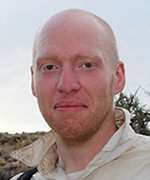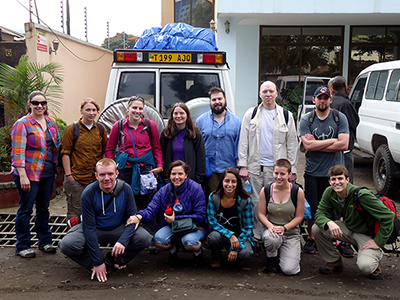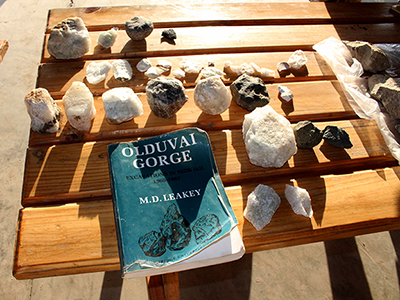
- senior Anthropology major
- minors in Chinese and Art History
- from Blanchester, OH
- interested in paleoanthropology
- received a Gilman Scholarship to dig for fossils in Olduvai Gorge, Tanzania
"The College of Arts and Science has given me the opportunity to learn about subjects I wasn't necessarily aware of. For instance, my art history courses increased my interest in paleoanthropology because they introduced me to the long and fascinating history of paleo rock art."
Why Miami?
"I actually came to Miami in a roundabout way. I'm a non-traditional student who joined the military after I graduated high school in 2000. After serving three years in the US Army 82nd Airborne Division, I briefly attended the University of Cincinnati where I majored in Chinese. The language program there was only two years long, so I was excited to learn that Miami had a four-year program. I took a tour and immediately fell in love with the beauty of the campus. This cemented my decision to transfer to Miami to finish my degree.
"I was inspired to learn Chinese after reading the great Chinese classic Journey to the West in the military. I had always loved martial arts and anime, but the novel ignited a fiery interest in East Asian history, religion, folklore, and literature. The more research I did on the influences of the novel, the more I realized that I needed to learn Chinese in order to read as yet untranslated scholarly papers and historical documents.
"This interest in China soon expanded to the history and culture of all of the world's great civilizations, which then led to my curiosity about how human culture had developed over countless millennia. I officially changed my major to anthropology during my junior year because my ever-expanding interests could not be contained by Chinese alone. Anthropology, or 'the study of man,' features a holistic four-field approach consisting of archaeology, linguistics, cultural studies, and biology. Studying these subjects has only served to stoke the fire of my curiosity!
"I later picked up a minor in Art History after taking several Asian art-themed courses, which were required for my Chinese major—now a minor. I love Buddhist and Hindu religious art the most out of all the genres I've studied. Viewing such art through the lens of anthropology has allowed me to better understand how religious beliefs are made physical through the mediums of paint, wood, and stone."
Best Miami Experiences
"Transitioning from military to college life was a huge culture shock for me. I still wasn't used to the collegiate atmosphere even after I transferred to Miami from UC. But diving head first into various clubs and events held around campus really helped ease the transformation from soldier to student.
"I'm involved with several student-run organizations, including the Primatology Club, the Anthropology Club, and the Asian American Association. However, my best experience at Miami so far is thanks to my Anthropology major.

Jim Mclanahan and fellow students prepare to depart for Olduvai Gorge base camp.
"Miami has plenty of opportunities to further explore one's academic interests. This was definitely my case when the chair of the Department of Anthropology, Mark Peterson, sent out an email featuring flyers for two biological anthropology-related field schools to be held the summer of 2014.
"One particular school that sparked my interest was a paleoanthropological field school in Olduvai Gorge, Tanzania, a country in East Africa. The Gorge is the most famous fossil bearing site on the planet because, as evidence suggests, it is the cradle of humankind. The school was hosted by the University of North Carolina at Greensboro under the auspices of a long running joint American-Spanish venture, The Olduvai Gorge Paleoanthropological and Paleontological Project (TOPPP).
"I was elated to find out that I had been accepted into the program a week after submitting my application. I then consulted Miami's Study Abroad office to explore scholarship opportunities. I applied for the Benjamin A. Gilman International Scholarship and was one of nine people—out of a total of twenty who applied—to win this prestigious award. This meant that not only was I going to dig for fossils in Africa, but also the US government was going to fit most of the bill free of charge! All I had to do in return was write a travel blog to record my experiences. This resulted in my WordPress blog 'An Ape in Africa.'"
Miami and Liberal Arts Education
"Getting a liberal arts degree is helpful because you have so much information to pick from. The College of Arts and Science enables you to take a variety of courses, so you're never restricted and have lots of opportunities to expand your mind.
"The College of Arts and Science has given me the opportunity to learn about subjects I wasn't necessarily aware of. For instance, my art history courses increased my interest in paleoanthropology because they introduced me to the long and fascinating history of paleo rock art.
"In the future I hope to work in a career that combines my love of East Asian culture and biological anthropology. I may pursue Chinese archaeology in grad school."
Digging for Fossils in Tanzania
"I spent a month sleeping in the open savanna, interacting with the local Maasai people, and training under some of the best anthropologists and geologists in the world. The field school students were able to dig at sites that are pushing the frontiers of human evolutionary research. Olduvai Gorge has continued to produce important finds for almost sixty years!

These hammer stones, a type of prehistoric tool that has been used for millions of years, were found in Olduvai Gorge.
"My greatest achievement at the field school was excavating the partial radius, or arm bone, of a Paranthropus boisei, a human cousin who lived around two million years ago. This is the second specimen of its kind yet known to science. The first postcranial P. boisei material was discovered only a couple of dig seasons before my arrival. But what's neat is that I actually trained under the anthropologist who discovered these fossils during my time at the field school.
"The biological anthropology courses I had taken at Miami prepared me for my time in Tanzania. Scott Suarez and Linda Marchant nurtured my love of primates and taught me the importance of using ape behavioral models when trying to construct the habits of a fossil ancestor.
"I feel I must thank a few other professors while I'm on the subject. Leighton Peterson opened my eyes to the interrelatedness of language and culture, and his high standards for scholarship forced me to strive for excellence. Jeb Card taught me to apply a skeptical lens to outrageous claims, and that popular pseudo-archaeological ideas can often be traced, oddly enough, to early 20th century science fiction. Ann Wicks introduced me to the beauty and complex meaning of East Asian art. Each of these professors have served as a constant source of inspiration. I hope to one day be half the scholars they are!"
Advice to Students
"My basic advice is simply to work hard and study what you're passionate about. I wasn't the best student in high school, but taking courses that I was interested in allowed me to excel in college. I'm on the Dean's List here at Miami every semester.
"Miami's anthropology department has a webpage containing information on field schools, internships, and scholarships. I recommend that you take advantage of these resources, because you never know what you'll find!"
[August 2015]
 Miami University Oxford, Ohio est. 1809
College of Arts and Science
Miami University Oxford, Ohio est. 1809
College of Arts and Science
 Miami University Oxford, Ohio est. 1809
College of Arts and Science
Miami University Oxford, Ohio est. 1809
College of Arts and Science